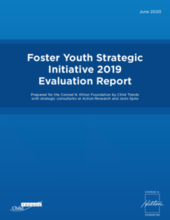Displaying 521 - 530 of 2221
The National Family Support Network has developed a unique 1-day in-person/virtual training for Program staff to maximize the great potential of Parent Advisory Committees.
This guidance from the American Academy of Pediatrics (AAP) is designed to support the continuation and improvement of efforts to ensure a stable home and caregiver for children in the child welfare system - which are important to nurturing their development and preventing trauma that can affect a child across the lifespan - so that all children and families may flourish.
"As COVID-19 cases continue to increase across [the U.S.], court orders from two different lawsuits have created a situation that lawyers and advocates are calling another form of family separation," says this article from Time. "Now, parents in Immigration and Customs Enforcement (ICE) detention must decide whether or not to keep their children with them in custody, or to release them out to sponsors."
This exploratory study provides early research to understand the relationship between levels of meaning-making and well-being in kinship caregivers.
This report summarizes some of the major accomplishments, challenges, and lessons learned from the Foster Youth Strategic Initiative, which aimed to ensure that older youth in foster care in Los Angeles County (LA) and New York City (NYC) become self-sufficient and thriving adults.
This study sought to better understand the relationship between homelessness and child welfare services (CWS) involvement and examine whether homeless shelter data could combine with CWS data to enhance intervention targeting.
The authors of this article sought to better understand the relationship between homelessness and child welfare services (CWS) involvement and examine whether homeless shelter data could combine with CWS data to enhance intervention targeting.
This paper explores within group differences for Mexican and Puerto Rican mothers vulnerable to child welfare involvement.
this study examines the relationship between needs, matched services, and child protective services (CPS) re-report.
This brief article from Student Affairs Today highlights some of the lessons learned by student affairs professionals regarding foster care support programs at higher education institutions in the United States in light of the COVID-19 crisis.

